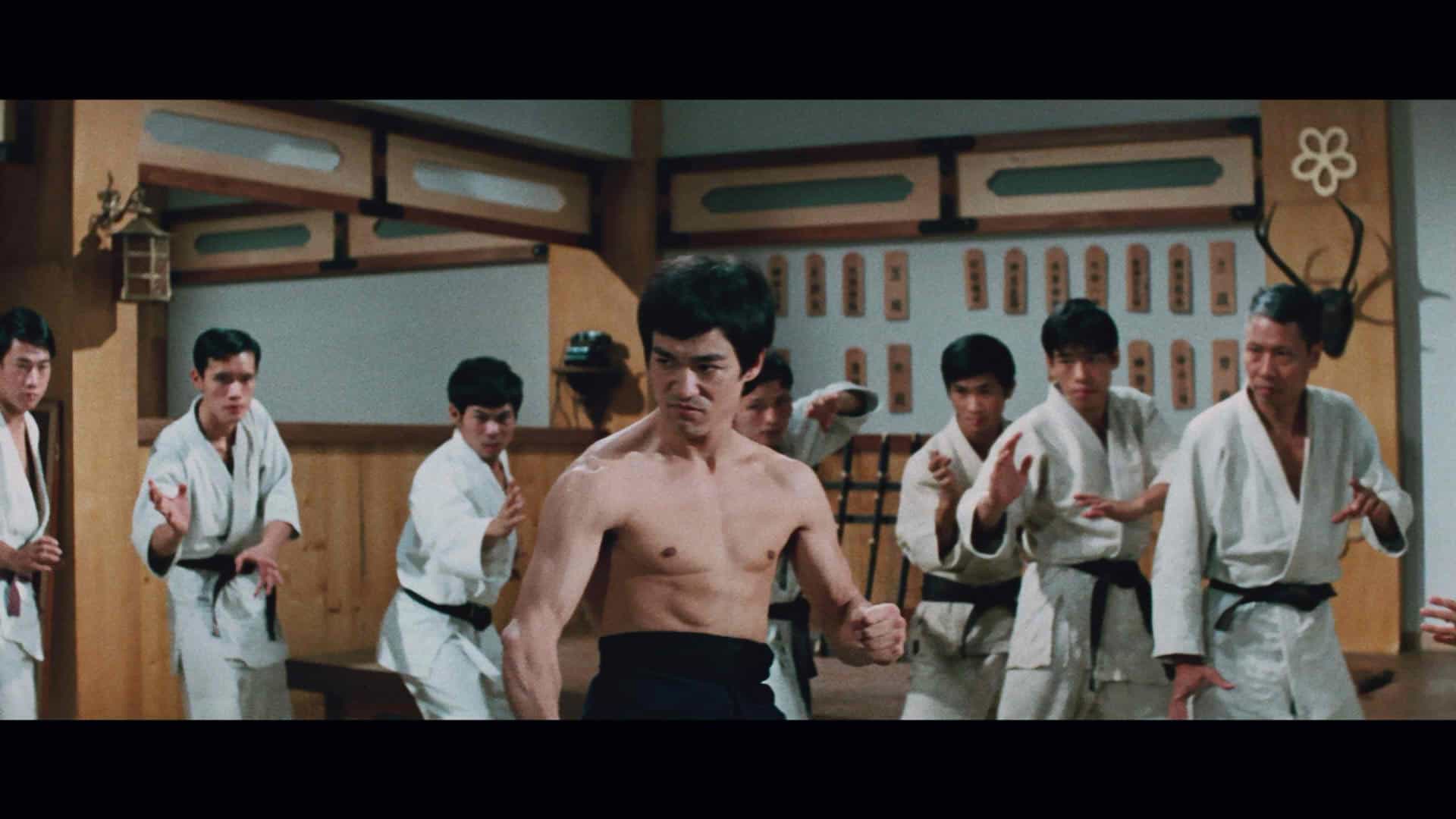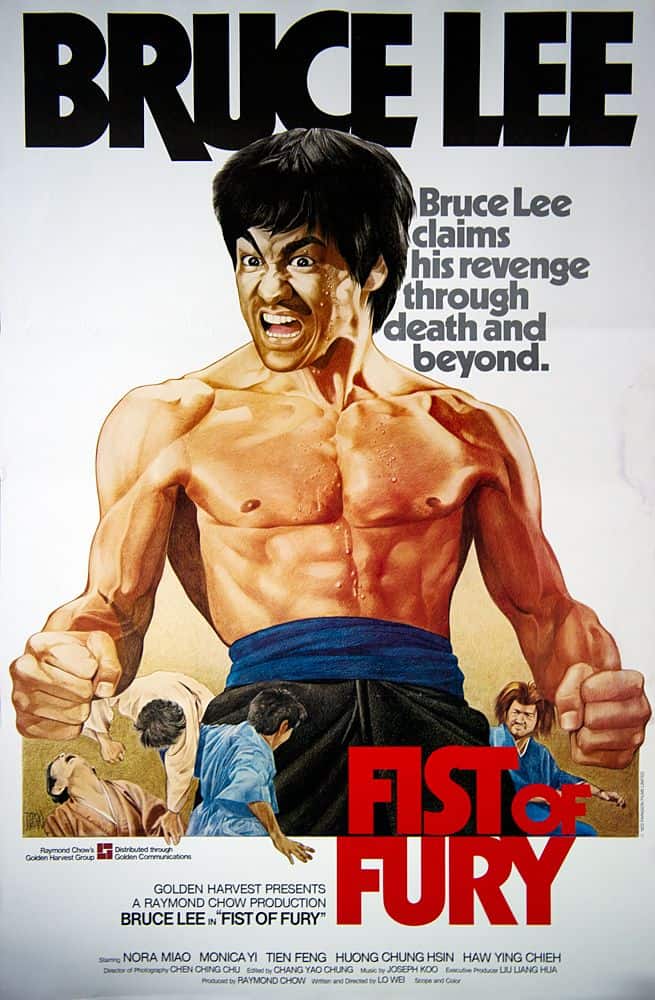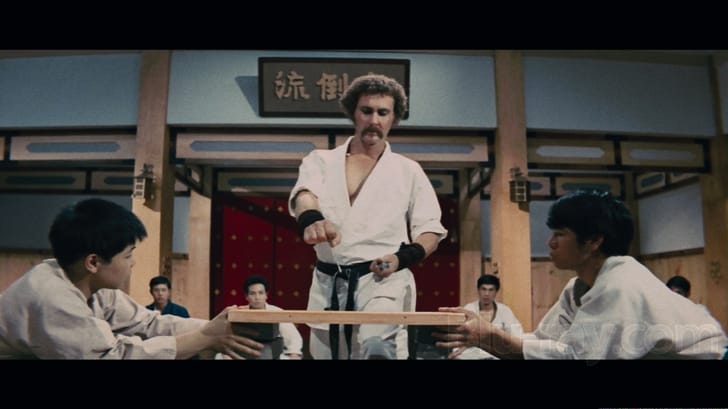Written and directed by Lo Wei
Hong Kong, 1972
In honour of the Fistful of Film Fury’s 50th column entry, it is only appropriate that the movie that partially lends the column its namesake get the review treatment.
It is a stormy night when Chen Zhen (Bruce Lee), pupil at the Jingwu school of martial arts, returns to marry his sweetheart Yuan Li’er (Nora Miao, whose character name is never actually mentioned in the film, oddly enough). The downpour is a bad omen, however, as Chen learns of his former teacher’s demise. Health professionals declare that that elder man died of pneumonia, but Chen was well aware of his master’s excellent health. Shortly after the burial, the school, now led by the eldest student Fan Junxia (Tien Feng), is perturbed during a mournful ceremony by a skinny little Chinese man (Paul Wei) accompanied by two Japanese judo artists. A rival school with Japanese roots, the Hongkou dojo, boastfully wishes to challenge Jingwu’s students. The Japanese insolence proves too much for hot-tempered Chen to bare, as he attacks the dojo despite Fan’s cries to remain calm. Now, Chen is at the center of everyone’s attention, from the Japanese, his fiancée, to even local Shanghai police inspector Yoshida (director Lo Wei), summoned by the influential Japanese to find and arrest Chen. With pride and emotions running high, a lot of butt kicking ensues.
If The Big Boss served as an entertaining introduction to Bruce Lee on the cinema screens, then Fist of Fury, known in North America for decades as The Chinese Connection, is the film by which the American-Chinese actor and martial arts guru solidifies his reputation as an arresting, wildly fascinating silver screen presence. The first movie had jaws dropping because Lee’s energy took them by surprise. This second endeavor only increases his action movie acumen by pitting the star against platoons of practicing martial artists that, realistically, don’t stand a chance at touching Lee, but, amazingly, that never spoils the fun.
Every so often the pleasure in witnessing a hero’s rise is seeing him or her stumble against a variety of foils before overcoming the odds, preferably through determination and courage, to finally vanquish the forces guilty of wrongdoing. In Bruce Lee’s case, there is nary a moment when it looks as if his Chen Zhen character is in any real physical danger. The greatest threat is when a Russian ex-pat criminal, housed for no particular reason by the Hongkou school, confronts Chen during the climax. The Soviet brawler connects a few good punches, sending Chen to the ground once or twice, but that is the extent of the physical adversity the protagonist faces throughout the entire film. Anybody familiar with Lee’s cinematic oeuvre knows that he was a gifted performer, a martial arts actor that relied heavily on speed and precision to impress audiences.
Those lighting quick reflexes, punches, elbow blows, and kicks make their welcome return in Fist of Fury, only that the number of opponents doubles, if not triples. There are times when Chen engages a ridiculous number of foes simultaneously in battle. Director Lo Wei and his crew are fully deserving of the plaudits that have come their way since the film’s original release for the excitement imbued in the stunt work. It’s very easy for modern audiences to be bored by older action films because the pacing of the fisticuffs was often much slower back then. The fight sequences in Fist of Fury, however, move at a surprisingly daring pace, taking advantage of every opportunity to demonstrate just how quickly Bruce Lee could fend off his co-stars.
While there is never any obvious danger to the protagonist’s physical well being, credit should go to the movie for telling a story that actually carries important consequences for its hero. There is never any doubt that the Japanese judo school represents the obvious evil. In fact, it couldn’t be made any clearer, which is a staple of countless Chinese and Hong Kong movies: just make the Japanese the villains and the movie should sell like hot cakes. On the flip side, Chen’s short temper incurs great consequences on his future with his fiancé and the school he has sworn to protect and avenge. In that regard, Fist of Fury is tinted with some bitter sweetness and, dare it be said, a modicum of nuance. The film does not shy away from the fact that although Chen looks awesome as he roundhouse kicks racist Japanese and the giant Russian bloke in the head, the fact of the matter is that his actions speak very ill for the Jingwu school. Without giving away the ending, it is surprisingly anchored by a level of poignancy.
It is difficult to focus on anything other than Bruce Lee whenever he is on the screen. His persona is so heightened, so intentionally hammy, that there are moments when it almost feels as though his co-stars are acting in a completely different film. The unbelievable aspect to all of this is that one wouldn’t want Lee to inject more subtlety into his performance in order to even the playing field, but rather wish some of the other actors would get in on the fun as well. That’s how fascinatingly hilarious Lee is as a performer. As with The Big Boss, the ADR sound effects that erupt in the soundtrack when Lee is angry and jump kicks people only increase the joyful silliness. Coupled with his facial expressions, Lee could be mistaken for being more beast than man.
Fist of Fury tells a very simple tale, the sort of tale that anyone that has seen a few martial arts movies will come to recognize immediately. The pleasure with Lo Wei’s picture rests more in the persona and aura its star gives off. The little bit of nuance peppered in the plot (the repercussions of Chen’s volatile, vengeful behaviour) help anchor the tale just enough to not make it seem like a complete excuse for advertising Bruce Lee, which is appreciated. It is safe to argue, however, that the plot could have been complete and utter hogwash and there would still be plenty for all to admire.
To the readers of this column, it’s been great writing about these 50 marvellously eclectic films. Here’s to many more!
Thank you very much. Bruce Lee would also like to share his appreciation:
-Edgar Chaput





